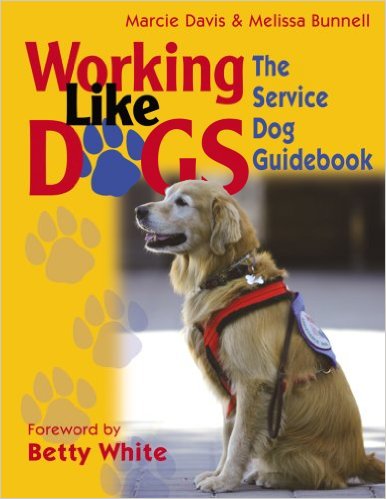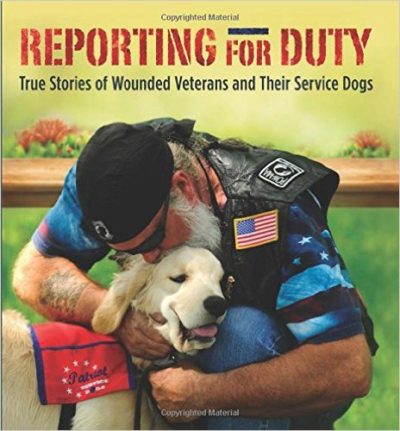 Whistle likes the holidays but isn’t sure about the reindeer antlers he’s wearing right now
Whistle likes the holidays but isn’t sure about the reindeer antlers he’s wearing right nowAs the holidays roll around again, many of us are preparing to host an annual holiday party. As you prepare your guest list, does it include someone partnered with an assistance dog? And if so, do you know how to make sure all your guests, both human and canine, feel welcome?
While most people are familiar with guide dogs that assist individuals who are blind or have partial vision loss, there are a variety of assistance dogs trained to help people impacted by spinal cord injury, hearing loss, post traumatic stress disorders, diabetes, or some other medical need.
More and more people with medical and physical limitations are discovering how assistance dogs can enhance their daily lives. There are multiple types of assistance dogs that provide an array of physical and mental support to their human partners.
Service dogs assist their human partners by carrying or retrieving items, pushing buttons (for example, on an elevator), opening and closing drawers, providing assistance with balance while dressing, helping with household chores and much more.
Hearing alert dogs alert individuals with hearing loss to specific sounds, including phones, doorbells, sirens, smoke alarms, crying babies and other humans.
Medical alert dogs respond to various types of medical events such as epileptic seizures, changes in blood sugar, heart attack, stroke, cancer and other potential medical emergencies. These dogs may be trained to alert their owner of an approaching medical event, pull an emergency cord, lick their owner’s face to notify him/her, or even retrieve the phone for a 911 call. Some dogs possess the ability to predict a medical event and will become restless or push against their partners to warn them.
When you invite someone who is partnered with an assistance dog into your home for a social gathering, there are some things that you need to be aware of in order to ensure that all your guests feel welcome. People are often confused about how they should behave around a working dog. After all, who can resist a gorgeous working dog, especially at a festive event?
It is important to recognize that although this is a social event and your guest is attending as a partygoer, their assistance dog is on the job and not in party mode. Your guest is dependent on their assistance dog for one or more medical needs. It is important not to distract their assistance dog. You should never speak directly to the dog or offer any type of food without first seeking the owner’s permission.
I often refer to assistance dogs as highly trained Olympic athletes who may be on special diets with strict feeding schedules. Unsolicited attention and food can be distracting to the dog and could be detrimental to their human partner’s safety and independence.
If you are aware your guest is partnered with an assistance dog, check in with him or her ahead of time and ask if there is anything you can do to accommodate him and his assistance dog while they are at the party. Share with him the best place to toilet his canine partner and ask if you can provide any water or snacks while the dog is at the party.
If you are hosting the party at your home and you have pets, consider placing your pets in a comfortable area away from the assistance dog and his human partner. Your family pets may not understand why a strange dog has entered their home and territory. Segregating the animals provides a safer environment and can reduce unnecessary stress.
When you are preparing the party area and placing chairs and other décor, consider allowing ample space for your guest and her assistance dog. You don’t want to isolate them but, you want to provide enough access area for the team to easily negotiate the area and mingle with other guests.
If you are really striving to be the “hostess with the mostess,” you may want to be aware of how other party goers are interacting with the working dog. Are they fearful of the dog or are they paying too much attention to the working dog? If so, you may need to provide some gentle reminders that this is a working dog and guests should not be touching or addressing the dog directly. You and your guests should always speak directly to the individual partnered with the dog. And, no one should pet the working dog without asking permission from their human partner.
Some of your other guests may be anxious or nervous about an assistance dog at the party. Don’t be afraid to reassure them that assistance dogs are highly trained to provide a variety of critical services to their human partner. Party goers with assistance dogs deserve the same respect as other party goers. That being said, you do have the right to ask the dog to leave if it is not behaving appropriately and jeopardizes the safety of other guests.
Keep it simple and remember these tips to ensure that everyone remains in the holiday spirit whenever they are meeting or approaching a working assistance dog and his or her human partner:
- Do not touch the Assistance Dog, or the person it assists, without permission.
- Do not make noises at the Assistance Dog; it may distract the animal from doing its job.
- Do not feed the Assistance Dog; it may disrupt his/her schedule and diet.
- Do not be offended if the person does not feel like discussing his/her disability or the assistance the dog provides. Not everyone wants to be a walking-talking “show and tell” exhibit.
Remember, it’s the holidays and everyone just wants to relax and enjoy the doggone party!!





